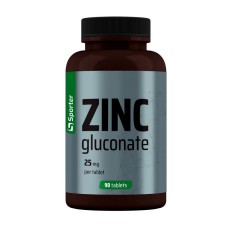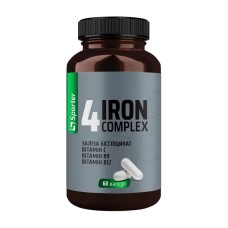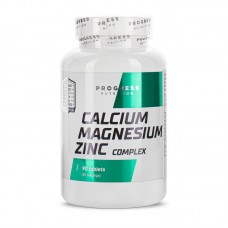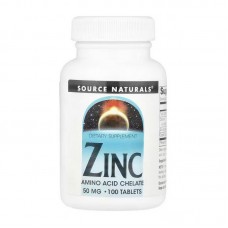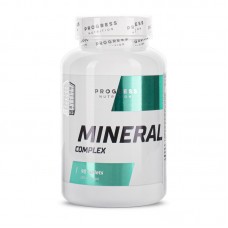Price: 0 uah
CheckoutMineral Complexes
A mineral complex is a set of ingredients necessary for the proper functioning of the body. It provides the body with important macro- and microelements that the human body cannot synthesize on its own.
When a healthy diet is insufficient and the body still lacks valuable minerals, dietary supplements containing essential elements come to the rescue.
 < /p>
< /p>
What Are Minerals?
Minerals are a group of nutrients that are not synthesized by the human body and must be obtained from external sources through daily food intake and/or dietary supplements.
These compounds are not a source of energy, but they are necessary for the normal functioning of the body.
Classification of Minerals
Mineral components can be divided into:
Macronutrients - mineral substances that make up more than 0.01% of the human body and the daily requirement for these components exceeds 100 mg. This group includes, among others, magnesium, potassium, calcium, or sodium.
Trace Elements - minerals, also known as trace elements, that make up less than 0.01% of the human body and the daily requirement for these components is less than 100 mg. This group includes, among others, zinc, selenium, iron, or fluoride.
Ultratrace Elements - sometimes considered a subgroup of trace elements. These are elements that are truly scarce in the human body. This group includes vanadium, nickel, cobalt, and molybdenum.
Properties of Minerals and Their Importance
Minerals are compounds necessary for the normal functioning of the body. These ingredients ensure the proper flow of important processes in the body and can also boost immunity, strengthen hair, nails, and skin, fight free radicals, reduce oxidative stress, or participate in the synthesis of various enzymes.
All minerals are important for the normal functioning of the body. Each of them has specific properties that can be discussed at length. Focusing on mineral complexes, we will briefly look at some of the components included in their composition.
Calcium
This is the main component of bones and teeth, which also participates in the blood clotting process. Calcium is classified as a macronutrient. This component takes care of proper muscle function and participates in nerve impulse conduction.
Magnesium
Magnesium is involved in nerve conductivity and muscle contraction. It is an activator of many enzymes and participates in protein synthesis.
Potassium
Plays an important role in maintaining water-electrolyte and acid-base balance. The element can also affect the maintenance of cell pH and fluid volume. It also participates in protein and carbohydrate metabolism.
Iron
This element is part of hemoglobin, so it is necessary for transporting oxygen from the blood to the body's cells. It also serves as a building material for many other proteins and enzymes, including myoglobin, which supports muscle function. Iron can have a positive impact on the nervous and immune systems.
Zinc
Zinc performs important functions in cellular metabolism, is responsible for the metabolism of proteins, fats, and carbohydrates. It is part of many enzymes, can affect the endocrine system, and also maintain the condition of the skin, hair, and nails.
Fluoride
It can influence the increase in tissue mineralization and limit the growth of cariogenic bacteria. It is necessary for the proper bone structure.
Selenium
Part of oxidoreductase enzymes involved in combating free radicals and eliminating oxidative stress. In addition, the element can influence the immune system. Selenium is also part of enzymes and supports the functioning of the thyroid gland.
Sources of Minerals
The main source of mineral substances is daily, healthy, and balanced nutrition. Valuable minerals are found in animal products as well as plant-based products.
Offal and red meat are rich in iron, while selenium can be found mainly in Brazil nuts and fish. Calcium can be obtained from milk and dairy products, and cereals and whole grains are a good source of zinc. Fruits and vegetables are a wealth of various minerals and vitamins, so they should be the basis of the daily menu.
Mineral Complex for Women and Men
It is clear that the needs of women and men are different. The need for microelements in the diet also varies depending on gender. Therefore, women and men should consider supplementing their diet with the appropriate mineral complex tailored to their individual needs.
Important Minerals in Women's Diet
A proper mineral complex in a woman's diet should include minerals such as iron, magnesium, zinc, selenium, and silicon.
Magnesium can affect muscle contractility, as well as blood pressure regulation and proper heart function. In turn, zinc can support the immune system and have a positive effect on the condition of the skin, hair, and nails. Silicon can also take care of the good condition of hair and nails, as well as participate in collagen synthesis. On the other hand, selenium can reduce oxidative stress and regulate thyroid hormones.
Minerals Important for Men
The demand for certain ingredients among men changes over time and depends on lifestyle, age, or physical exertion.
A good dietary supplement for men should include, among other things: potassium, magnesium, zinc, iron, and selenium.
Magnesium and potassium can support heart and muscle function. These ingredients can also help reduce stress. Zinc and selenium can have a positive impact on fertility and prostate function, as well as the immune system. In turn, an adequate supply of iron ensures the transport of oxygen to cells and can reduce the risk of anemia.
Minerals in an Athlete's Diet
A sufficient supply of minerals is also very important in an athlete's life. A deficiency of important minerals can prolong the recovery and regeneration time after physical exertion, as well as contribute to a decrease in overall psychophysical performance.
In the diet of physically active people, special attention should be paid to ensuring an adequate supply of elements such as potassium, sodium, magnesium, calcium, iron, or zinc.
Some elements, such as sodium or potassium, have alkalizing properties and can contribute to reducing muscle acidity and faster recovery after training.
During intense physical exertion, valuable ingredients are lost along with sweat. Therefore, it is necessary to replenish the minerals eliminated from the body during workouts every day.
In case of difficulties in meeting the need for macro- and microelements, mineral complexes should be used to compensate for deficiencies in the body and have a positive impact on the condition and strength of athletes.
Mineral Substances in the Diet of Elderly People
Maintaining an adequate intake of macro- and microelements improves overall health. Thus, minerals can make the aging process less challenging.
Often, elderly people have a deficiency of calcium, potassium, iron, and magnesium.
Since calcium is a major component of the skeleton, its deficiency can contribute to an increased risk of osteoporosis and fractures of all kinds.
Iron deficiency, in turn, leads to anemia, which is very common in elderly people. Inadequate intake of the element manifests as fatigue, weakness, and increased heart rate.
Magnesium, on the other hand, is involved in nerve impulse conduction and can prevent the formation of clots. Its deficiency can contribute to unpleasant muscle cramps, sleep problems, and mood swings.
Potassium, like sodium, can help maintain normal blood pressure. In addition, potassium can have a positive effect on the work of the heart and circulatory system.
It is important for every elderly person to adhere to a balanced and varied diet, full of seasonal vegetables and fruits. The elderly should not give up meat and fish, as well as whole grain products. In case of difficulties in meeting the need for valuable minerals, one should consider supplementing with mineral complexes to replenish the emerging deficiencies in the body and take care of good well-being.
Mineral Complex or Individual Minerals?
You may be wondering whether it is worth reaching for mineral complexes, or if it is better to supplement each of the ingredients that your body lacks separately.
If there is a deficiency of one or two elements in the body, it is advisable to take separate supplements containing that ingredient.
However, when the body lacks more minerals, or in case of significant deficiency, for example during intense workouts, illness, or weakened immunity, the use of mineral complexes that provide the body with all the important macro- and microelements seems justified.

